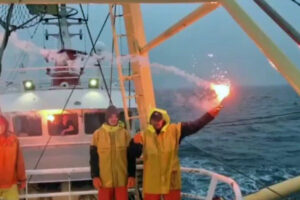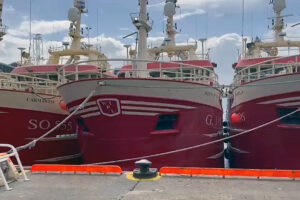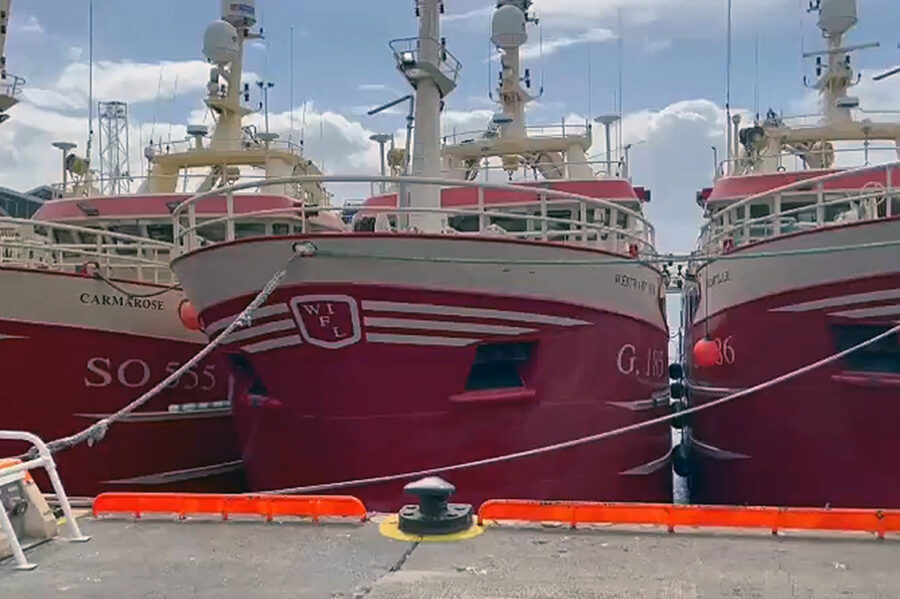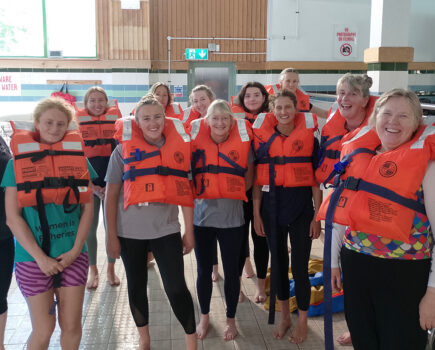Vessels across continent sound ‘distress call’ on Europe Day
Irish vessels were among those sounding their horns last week as fishermen from across the EU came together in protest at plans to further restrict bottom fishing.

The noisy – and colourful – protest brought together a range of nations, with vessels from across Europe encouraged to sound their sirens and horns for five minutes, whether in port or at sea.
The protest, organised by the European Bottom Fisheries Alliance (EBFA) and the European Transport Workers’ Federation (ETF), supported by Europêche, EAPO and Cogeca, culminated at midday on Tuesday, 9 May – Europe Day – with vessels from across the EU sounding their sirens and horns for five minutes as a ‘call of distress, to voice that the fishing fleet is gradually disappearing’.
EBFA says that the European Commission’s ‘action plan’ to protect marine ecosystems, which aims to prohibit bottom fishing in 30% of available grounds, alongside the Natural Restoration Law, will put 25% of Europe’s seafood production at risk, along with 7,000 vessels and the jobs of 20,000 fishermen.
The action was supported by the Irish Fish Producers’ Organisation (IFPO). Its chief executive, Aodh Ó Donnell, said there had been a ‘great turnout from vessels of all classes and segments in Ireland’.
“Many of our key species such as scallops and Dublin Bay prawns have been fished for generations by family-run businesses using bottom- fishing systems. They represent a traditional way of life and are the economic and social strength for many communities, some of which will be put at risk,” he said.
“Our members fully support conservation of fishing stocks and species, and adhere to quota restrictions to promote the long-term sustainability of our oceans. As stakeholders, we have a vested interest in maintaining healthy seas. We are delivering on the sustainability targets.”
Aodh Ó Donnell said the ‘harsh reality is that we have never had a fair share of EU quotas’. “We’ve taken the biggest quota hit post- Brexit, and as a result we are decommissioning a third of our whitefish fleet. Despite all of this adversity, we are now facing another potential huge cut in fishing opportunities.
“We are committed to conducting responsible fishing in ways which utilise technical measures that protect and conserve marine life. The Irish fishing sector is leading the way in working with the Irish Sea Fisheries Board in developing and applying innovative trawling techniques.
“The EU should be talking to the fishing industry about these effective innovative options, instead of simply imposing a unilateral ban. This proposed ban will prevent trawling in large areas of traditional fishing grounds which are of critical importance to IFPO members and many other Irish fishing vessels.”
Iván López van der Veen, chair of EBFA, said that ‘fishers and their communities are European citizens’. “Through the Common Fisheries Policy, we are under the stewardship of the European Commission, who should care for us.
“We fulfil our role by providing the best-quality and healthy food to our fellow EU citizens. We do it sustainably, under one of the most stringent regulations in the world, and we do it proudly. We deserve respect and recognition from the authorities. Instead, we see our way of life endangered”.

Vessels alongside in Killybegs were among those taking part in the EU-wide protest.
The action also had the ‘unconditional support’ of the Spanish Fisheries Confederation (Cepesca), which said the protest brought together ‘fishermen, ship owners and unions’.
Javier Garat, secretary general of Cepesca and president of Europêche, said: “This package of measures from the European Commission is a point of no return for European fishing capacity, from which we believe it will be impossible to recover.
“Europe must reconsider the future sustainability of this activity with a global vision, and not leave the food of its citizens in the hands of third parties, as has already happened, unfortunately, with other industries, further weakening its food sovereignty.”
Aodh Ó Donnell said that the key message of the protest was to demonstrate that ‘the entire industry is in solidarity in protesting against the actions of the EU’.
In the Netherlands, where a new political ‘farmer’s’ party has gained widespread support from the fishing industry, and with many supporters blaming Brussels for pressure on both the agriculture and fisheries sectors, fishermen let off flares as part of their protests.
In Denmark, however, one fishermen’s leader told FN: “We did not really have anyone protesting here in Denmark. I am not sure anyone in the fisheries knows about the Europe Day on 9 May or cares about it.
“However, we expect to have plenty of lorry drivers protesting on Monday (15 May) against the latest Green Tax – this will be supported by farmers and fishers. And we expect fishers in Denmark to use this opportunity to protest against the trawl ban, MPAs, UK MPAs and UK policy, Norway and the obligatory use of CCTV on vessels.”
This story was taken from the latest issue of Fishing News. For more up-to-date and in-depth reports on the UK and Irish commercial fishing sector, subscribe to Fishing News here or buy the latest single issue for just £3.30 here.
Sign up to Fishing News’ FREE e-newsletter here.








